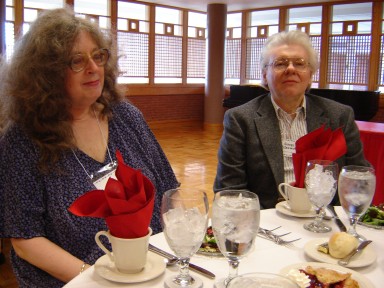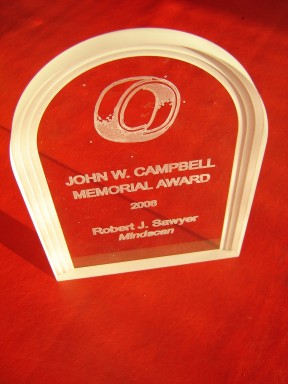Campbell Award Conference
by Rob - July 15th, 2006.Filed under: Uncategorized.
I’m back home after nine days on the road, and finally have a chance to properly update my blog. This entry is about the Campbell Conference, held July 5-9, 2006, at the J. Wayne and Elsie M. Gunn Center for the Study of Science Fiction at the University of Kansas.
On Wednesday, June 7, 2006, I received an email from James Gunn telling me that my Mindscan had won the John W. Campbell Memorial Award for Best Novel of the Year. I was absolutely thrilled by this news, of course — the Campbell Memorial was the only one of the big-three science-fiction novel awards that I hadn’t yet won.
Along with the news of my win came an invitation to attend the Campbell Conference, at which the award would be bestowed. I knew immediately that I had to go — the conference is legendary — but it also meant I’d have to change my already-made plans for that weekend: the Campbell Conference was to be held at the same time as Readercon, a literary SF convention held near Boston that I like very much.

Lou Anders, Paolo Bacigalupi
In the event, the Campbell Conference turned out to be at least as interesting, if not more so, than Readercon. At Readercon, I would have had fifty five-minute conversations over the course of the weekend; at the Campbell Conference, it was more like five fifty-minute conversations — and they were unfailingly stimulating, interesting, and pleasant.
I was delighted to get to spend major time talking with Lou Anders, the editor of Pyr Books (and of the 2006 anthology Futureshocks, which contains my story “Flashes”). And it was wonderful to get to spend a lot of time with Paolo Bacigalupi, who won the Theodore Sturgeon Memorial Award for Best Short Story of the Year at the same conference, for his wonderful “The Calorie Man.” Indeed, Lou, Paolo, and I were so simpatico about what’s right and wrong with SF, and about how the art form should be practiced, that it was like I’d found two brothers I didn’t know I’d had.

Pamela Sargent, George Zebrowski
It was also great to get to spend a lot of time with old friends George Zebrowski and Pamela Sargent, who were both there. Indeed, on Saturday afternoon, George and I did an on-stage interviews of each other that went really well. Other interview pairings that day: Lou and Paolo; Kij Johnson and Pam Sargent; previous Sturgeon and Campbell winner Bradley Denton and Jim Gunn; all were fascinating to hear.
Before the interviews, John Ordover, currently editor of Phobos Books, and, prior to that, editor of Pocket’s Star Trek novel line, gave a very provocative speech decrying that science fiction is not sufficiently derivative — that is, that the reason it’s selling so poorly is that, unlike other genres, it fails to provide a reliable, predictable reading experience. It was intriguing to hear what many of us think of as SF’s greatest artistic strength being shown to also be its greatest commercial weakness.
This wasn’t the first good speech of the conference, though. On the opening night — Thursday, July 5, 2006 — Lou Anders and George Zebrowski each gave excellent keynotes about the state of the SF novel. Lou’s in part touched on the value of the small press — something I certainly can related to, since I edit my own small-press line. And George’s talk detailed all the ways in which the business practices of big publishers rip off authors and keep good work in the field down.
I also had great chats during the course of the conference with Kij, writer and academic Chris McKitterick, and SFWA President Robin Wayne Bailey. And I got to spend time with author Diane Turnshek, SFWA news director Keith Stokes (whose great pictures — much better than mine! — from the conference are here), and Thomas Seay, who works with the About SF website.
Jim Gunn’s famed SF writing workshop was just concluding at the Campbell Conference began, and I also had lots of great conversations with the students (and was quartered in the same dorm as them).

Jim Gunn presents Campbell to Rob
The awards banquet was Friday night, and a very classy affair it was, too. The Sturgeon was presented first, then the Campbell. Instead of just announcing the winners, though, first judges praised at length the third- and second-place works, which was a very classy touch. Third-place for the Campbell was The Summer Isles by Ian R. MacLeod; second-place was Spin by my great friend (and previous Campbell Memorial Award winner) Robert Charles Wilson. I was not the only one to note how cool it was that Canadians took the top two spots for the Campbell. Jim Gunn presented the Campbell to me.

Paolo and Rob holding the permanent trophies
For both the Campbell and the Sturgeon, there are permanent trophies that stay at the University of Kansas, inscribed with the names of all the winners to date. Paolo was visibly moved to see his own name engraved alongside those of so many of his idols. I had the same feeling. In particular, since Fred Pohl’s Gateway is my all-time favorite SF novel, it was stunning to see my Mindscan and that book being listed together.

Rob’s trophy
The winners also get beautiful etched acrylic trophies to take home. They really are gorgeous, and, as I quipped at one point in the conference, it’s cool to have trophies that are quantally entangled — no matter how far my personal one moves away from the permanent one in Kansas, they will both always say “Robert J. Sawyer” on them.
I wish I’d had more of a chance to talk with Jim Gunn at the conference, but I did get to say publicly in front of everyone how big an influence he’d been on me. Many of my novels and short stories involve SETI (especially the novels Golden Fleece, Factoring Humanity, Mindscan, Rollback, and the short works “You See But You Do Not Observe,” “Ineluctable,” and “Flashes”), and there’s no doubt that that’s because of the huge impact Jim’s 1972 novel The Listeners had on me.
The Campbell Conference also included three wonderful receptions/parties at Chris McKitterick’s house, a terrific night out at a local restaurant, a very successful mass autographing at the university bookstore, and lots of really penetrating conversation, panels, and talks. All in all, it was one of the absolute peak experiences of my life, and I enjoyed every single minute of it.

